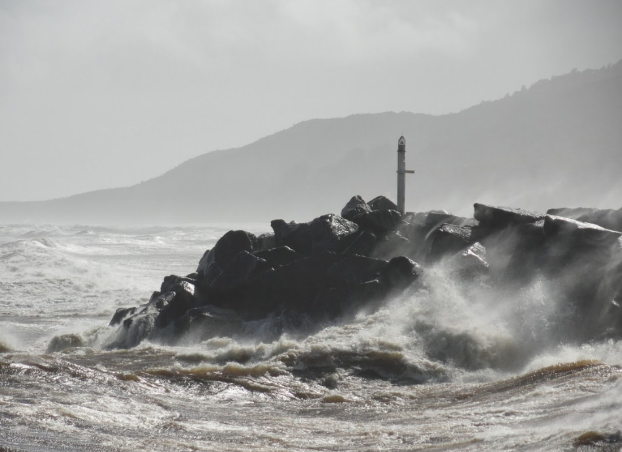Climate change anxiety | Anipā o te huringa āhuarangi
Key points about climate change anxiety
- The reality of climate change can feel overwhelming. This is why it has been labelled a crisis.
- Younger people are more affected, because it is of most relevance to their lifespan.
- Experiencing some climate change anxiety is normal, but if it is so strong that it interferes with your normal day-to-day life, seek help and support.
- There are things you can do to help manage your anxiety.

Climate change anxiety (anipā o te huringa āhuarangi) is a sense of fear, worry or tension linked to climate change. Climate change anxiety is also called eco-anxiety. That anxiety can come from the pressure to take individual action while seeing societal inaction.
If you worry a lot about the climate, it can affect your mental health. Your feelings show that you care and understand the situation. You are not alone and it’s really important to look after yourself in this time and know what you can do to help manage your anxiety.

Image credit: Canva
Anxiety self-assessment
You can take a test to assess your anxiety. The test is also available in multiple languages.(external link)(external link) Its aim is to give you a general idea about your level of anxiety rather than providing a formal diagnosis. For example, if you score about 10 on this test, it suggests you might have a moderate level of anxiety and that it would be a good idea to talk to someone who can confirm a diagnosis and help you to manage it.
Climate change anxiety affects people in different ways. It can cause a range of psychological and physical symptoms such as feeling:
- helpless
- angry and frustrated
- tense and on edge
- upset and irritable
- unmotivated and unsocial
- tired from lack of sleep
- loss of confidence
- guilty
- like you’ve let people down
- not heard.
Symptoms can come on gradually or build up quickly and sometimes they can go away. As anxiety increases, it can lead to changes in your behaviour.
You might regularly:
- feel worried about your future and find it difficult to make long-term decisions
- feel you are losing your culture and connection with the environment.
Below are some ways you can help manage your feelings. They may not work for everyone and if you are still feeling unsure about how to deal with your feelings, speak to a friend, a family member or your GP.
Know you are not alone
You are not alone in how you are feeling. Your feelings matter and they make sense. It shows that you care about others and the world around you.
Talk about it
Talking to people can be reassuring and can improve your self-esteem and your confidence. Talk with friends and family about your concerns and encourage them to take climate action. If you’re feeling overwhelmed, they may advise you speak with your GP or a counsellor.
This guide from Climate Outreach on how to have a climate change conversation(external link) can help with these conversations. Read stories of progress and hope from Future Crunch(external link) and The Daily Crunch(external link).
Keep active
Physical activity can help your mood. Activities could include going for a walk, cycling, running or yoga. Join a friend or a local group to keep active or incorporate physical activity in your travel.
Switch off regularly
It’s easy to keep reading about the climate crisis and to hear about it. It can even be seen around you through flooding or fires. Try to focus your mind on other things you enjoy. It may help to write down all of your worries before you try to switch off. It can be hard to empty your mind so practice switching off regularly.
Book an appointment with your local Member of Parliament
Tell them about your concerns for the future and encourage them to take action.
Choose organisations that are more climate friendly
This process works better collectively. If you see groups, educational facilities or businesses that are doing things in a non-climate friendly manner, then you can use your power as a consumer and politely tell them why this offends you.
When you are buying something consider if you really need it and if you do, try ethical purchases.
Build your confidence by taking environmental actions
Make climate change a factor in the decisions you make around what you eat, how you travel, and what you buy. But remember that everyday activity can be climate damaging in some way so be kind on yourself when examining your activities and their effects. Some changes could include:
- eating a plant based diet with healthy portions and no waste. There are some great meat-free substitutes out there which are similar in cost and texture to meat.
- set up a compost bin for any food waste. Some composts can even break down carbohydrates!
- feedback on submissions from places like the council. Your feedback matters.
- switching from using a car to a bike, walking or public transport especially for those short journeys.
Reach out to other likeminded people or groups locally. Many of those people or groups will be working on solutions that will make the world happier, healthier and safer. You can join them in taking action or just doing something differently. Examples of groups include:
- pest free wildlife groups
- planting
- walking
- neighbourhood clean ups
- community waste cooking groups.

Image credit: Canva
You can also try to see if there is anything you could do in your workplace or place of education eg, recycling, encouraging non-car methods of travelling or joining support groups.
Spend time outdoors
Being around nature can help your mood and your spiritual health (wairua). It is a reminder that you are connected with the world around you. Take a walk, smell the air, hear the sounds around you and see the life growing on the trees and in the birds. If you’re spending time in nature with your family and friends, well that’s even better. Read more about letting nature in to strengthen your wellbeing.
Sleep
While anxiety can affect your sleep, not getting enough sleep can also contribute to making you more anxious. Make good sleep a priority. Follow our sleep tips to help with this.
Apps reviewed by Healthify
You may find it useful to look at some Anxiety apps and Meditation and mindfulness apps.
It can be difficult to see a loved one with climate change anxiety. There are things you can do to help.
- Acknowledge their anxiety and distress and actively listen to their concerns
- Remind them it’s not all on them then help them come up with do-able ways to do things – individually or together with you.
- Help reframe their concerns to something less scary. This could include finding good news stories about positive change and action.
- Help guide them through emotional regulation techniques. These could include breathing techniques, mindful practices or focusing on a task.
- Help towards solving the problem by doing things like going to a local group together, or organising shared activities such as eating less meat, switching to more environmentally friendly ways of travelling (eg, cycling, walking), setting up a worm farm or spreading awareness.
Build your support network – a few people you can go to when things get tough. Here are some support groups.
The following links have more information about climate change anxiety:
Second opinion – tips for helping young people navigate climate anxiety(external link) Blue Shield of California, US
Living with worry and anxiety amidst global uncertainty(external link) Psychology Tools UK
The stress bucket(external link) Mental Health UK, UK
Our planet now(external link)(external link) BBC, UK
Podcast climate anxiety(external link) Christchurch libraries, NZ
Carbon footprint tools Gen Less(external link) and FutureFit(external link)
Generation zero(external link) NZ
JUMP change the system(external link), UK
Future Crunch(external link) Australia
The Daily Climate(external link) US
Eco-anxiety – how to cope with it(external link) Anxiety NZ
Apps
Anxiety apps
Meditation and mindfulness apps
Brochures
There is a way through – a guide for people experiencing stress, depression and anxiety(external link) Health Promotion Agency, NZ, 2022
References
- OraTaiao – NZ(external link) Climate & Health Council, NZ
- Climate Change(external link) The NZ Psychological Society
Credits: Healthify editorial team. Healthify is brought to you by Health Navigator Charitable Trust.
Reviewed by: Dr Sylvia Boys, Emergency Medicine Specialist, Counties Manukau
Last reviewed:
Page last updated:





